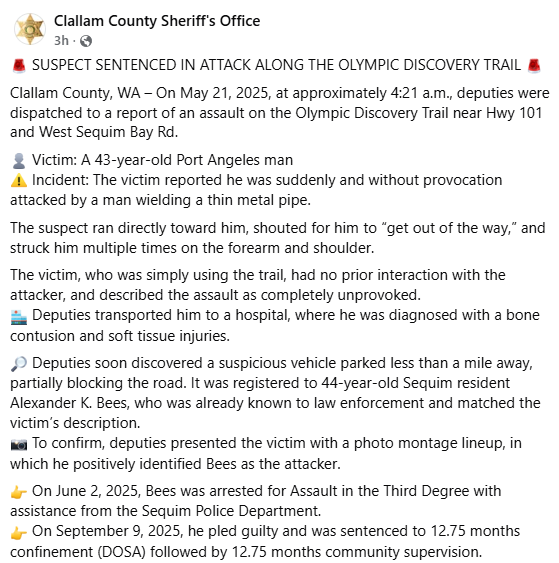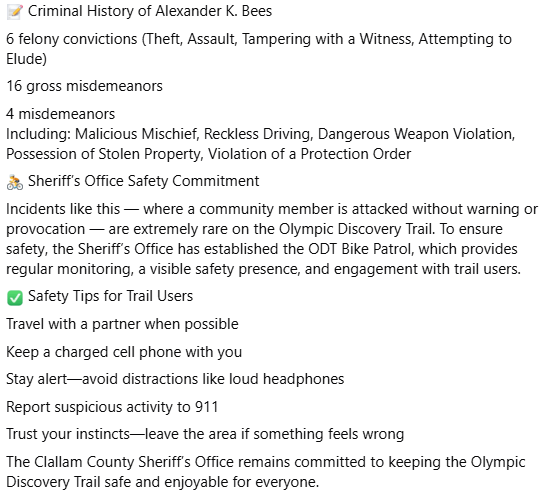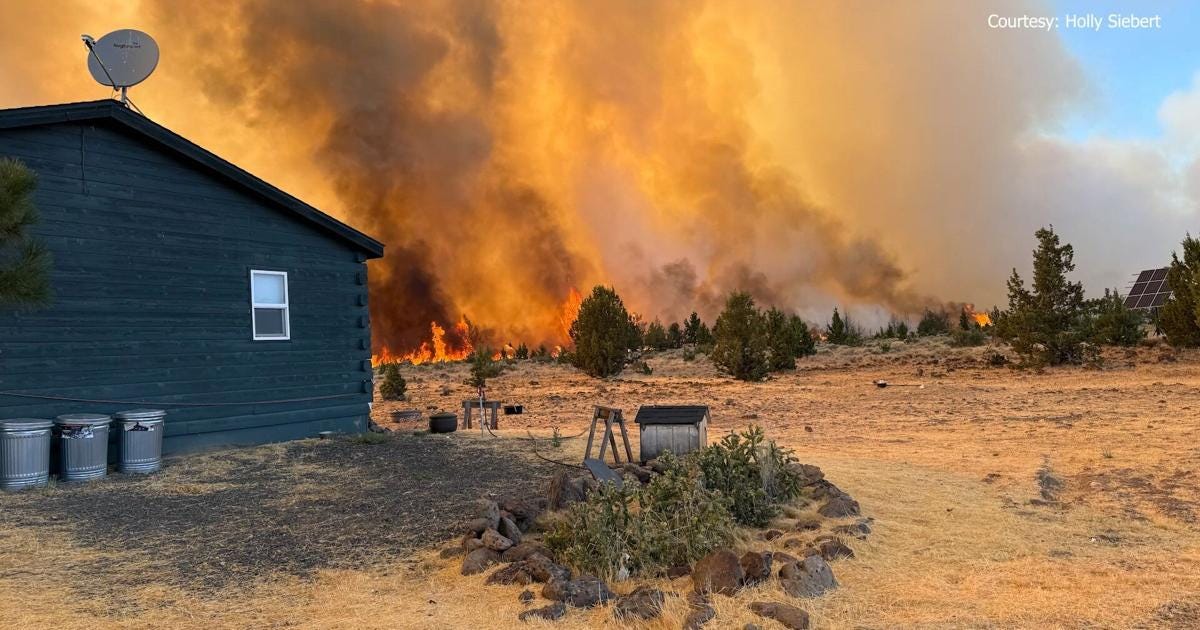From an unprovoked attack on the Olympic Discovery Trail to six-figure salaries for nonprofit executives, from Sequim lawsuits to wildfire warnings ignored in Oregon, these stories all connect back to a single theme: when government and media fail to put the public first, the public pays the price.
Trail attack hidden from the public
On May 21, 2025, a Port Angeles man was brutally attacked while using the Olympic Discovery Trail near Highway 101 and West Sequim Bay Road. The assailant, Alexander K. Bees, rushed at him with a metal pipe, shouting for him to “get out of the way,” before striking him multiple times. Deputies later identified Bees and arrested him for third-degree assault.
Bees’ record is lengthy: six felony convictions, 16 gross misdemeanors, and four misdemeanors, including malicious mischief, reckless driving, and violating a protection order. On September 9, he pled guilty and was sentenced to just over a year in confinement under a drug-offender program, followed by community supervision.
Despite the seriousness of this random, violent assault, the community didn’t hear about it for months. KIRO 7 out of Seattle broke the story on September 22—four months after the attack. Only then did the Clallam County Sheriff’s Office and Peninsula Daily News follow suit. Why was the public kept in the dark about a repeat offender striking an innocent trail user on one of our county’s most popular attractions?
Media silence and the “trusted” brand
The Peninsula Daily News claims newspapers are still the “most trusted journalism available.” Yet, when a violent, unprovoked attack occurs on a public trail, they sit on the story for four months. That raises questions about what qualifies as “newsworthy”—and whose interests are really being served.
Decline of a local paper
The PDN’s problems don’t end there. The “daily” paper now prints just five editions a week, which get thinner every year. Its parent company, Sound Publishing, recently shuttered a printing press, and the paper abandoned its historic downtown office for a strip mall.
Even as it cuts coverage and capacity, the PDN is soliciting donations to stay afloat—asking readers to subsidize what advertisers no longer will. The once-proud paper, founded in 1916, is shrinking, but local chambers still staged a ribbon-cutting for its new location. For longtime readers, the decline isn’t worth celebrating.
The Olympic Discovery Trail’s new boss
The Peninsula Trails Coalition, the nonprofit behind the Olympic Discovery Trail, has hired its first executive director, Ann Livingston. Her résumé reads like a who’s who of national climate organizations: the Natural Resources Defense Council, the Southwest Energy Efficiency Project, and multiple sustainability posts in Boulder, Colorado.

Her $98,000–$110,000 salary is nearly double Clallam’s median household income, with generous benefits, stipends, and holidays. Livingston has openly emphasized working closely with tribes as a priority. It’s a clear sign of where the coalition’s focus lies. Will the trail remain a community asset—or be reshaped around agendas that don’t always align with local needs?
Murder trial and a troubling history
Aaron Fisher, accused of killing Richard Madeo in the Sequim Safeway parking lot during the Irrigation Festival, is awaiting trial in November. Despite Fisher’s lengthy criminal record, Judge Brent Basden reduced his bail from $500,000 to $150,000. If released, Fisher would be subject to electronic home monitoring, with exceptions for work, medical visits, church, and grocery shopping.
The concerns go beyond the murder charge. In 2024, Fisher was accused of sending explicit messages and photos to a 13-year-old girl. With such a disturbing pattern, the community has every right to ask: why was bail lowered, and how many red flags must appear before the system holds him fully accountable?
Sequim faces legal threat over development
The City of Sequim is under threat of a lawsuit if it excludes Seabrook’s Westbay project from its development moratorium. The city had been directed in 2019 to amend its comprehensive plan, but the work was never done.
Similar disputes have bankrupted other small cities, including Cle Elum, which collapsed under $26 million in legal damages after a developer lawsuit. Sequim now faces the same risk, and next week’s closed-door council session may address the litigation. Transparency will be key—residents deserve to know if their city is gambling with its financial future.

Homeless camps: Jefferson closes, Clallam could expand
The City of Port Townsend is closing a notorious homeless encampment after repeated fires, dangerous calls, and public safety concerns. Police warned that incidents nearly doubled this year, straining resources.
Meanwhile, across the county line, Clallam continues to allow homeless camps, distribute free drug paraphernalia, provide free transportation, and fund permanent luxury “supportive” housing. It’s no wonder some displaced residents may soon move here—Clallam has effectively built a magnet for encampments, even as other counties acknowledge the risks.
Big salaries for “job creation”
Commissioner Mike French has championed a federal “Recompete” grant program to address unemployment. Its goal is to help people earn $26 per hour through training and support. Yet the county’s first hire under the program—a Recompete Plan Coordinator—will make between $106,000 and $129,000 a year.
That means the coordinator will earn twice what the program defines as a “good-paying job.” Once again, government has prioritized creating a high-salary administrative position before delivering results to the people the program was supposed to serve.
Lessons from Oregon’s wildfires
In Oregon, elected officials ignored warnings about man-made fire risks from homeless encampments. The result: 24,000 acres of Deschutes National Forest burned, along with five homes and twelve other structures. Thousands were evacuated, and wildlife was decimated.
Despite overwhelming evidence that homeless camps were fueling repeated fires, progressive officials dismissed the warnings, preferring to blame climate change. The parallels to Clallam County are obvious: if we refuse to acknowledge risks on our own public lands—including Olympic National Park—we could face the same devastation.
Read Kevin Dahlgren’s article “Oregon Progressive policies just went up in smoke” here.
Local voices on local airwaves
Finally, a note of thanks. KSQM generously invited Clallam County Watchdog on-air for an hour, joining Rich for a lively, thoughtful, and welcoming conversation. Local radio remains one of the most open and community-driven platforms left—and we’re grateful for the chance to share our work directly with listeners.




















